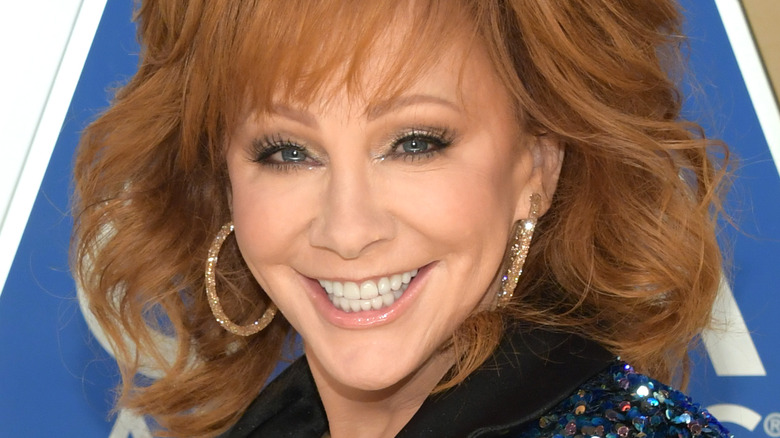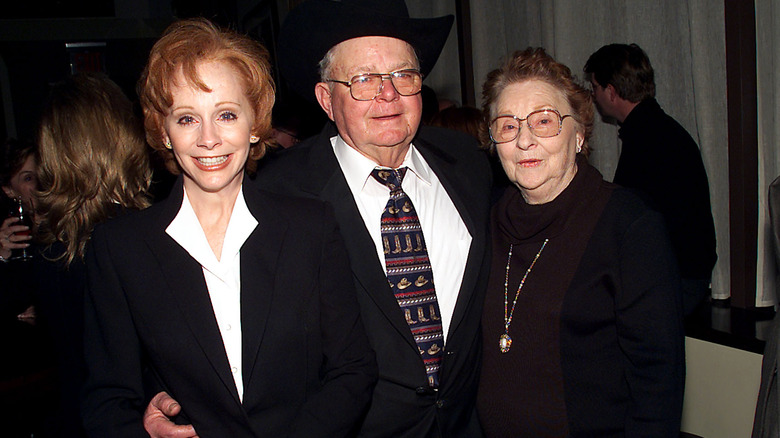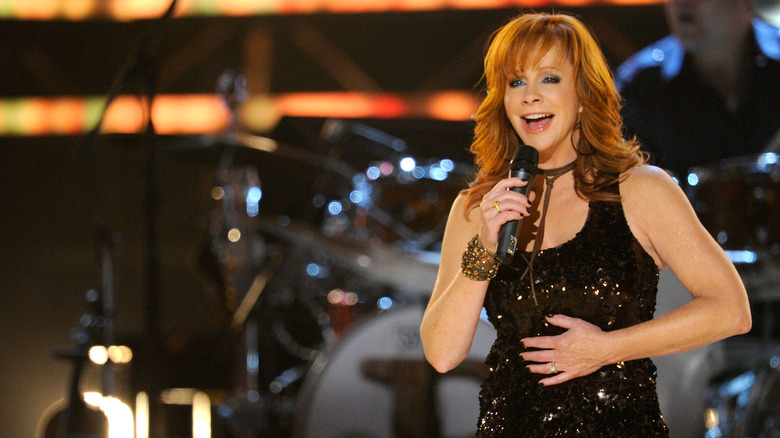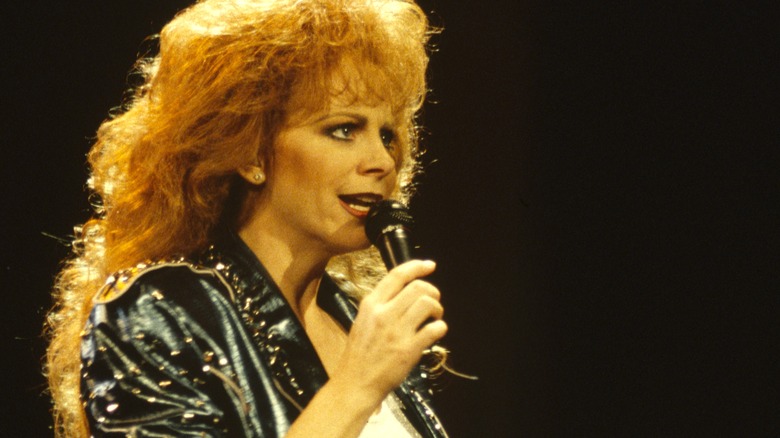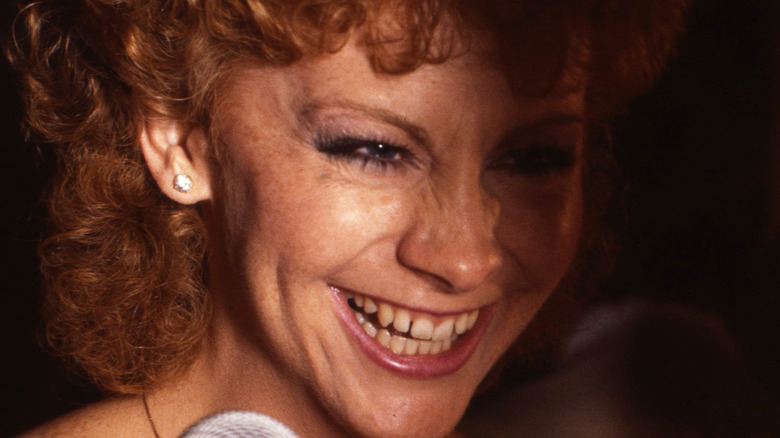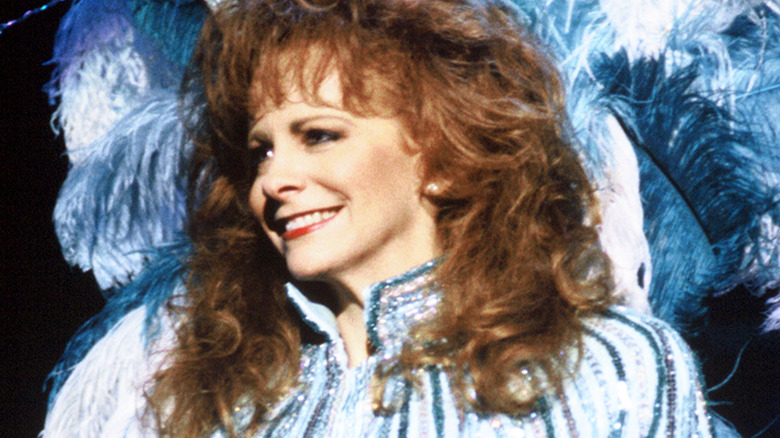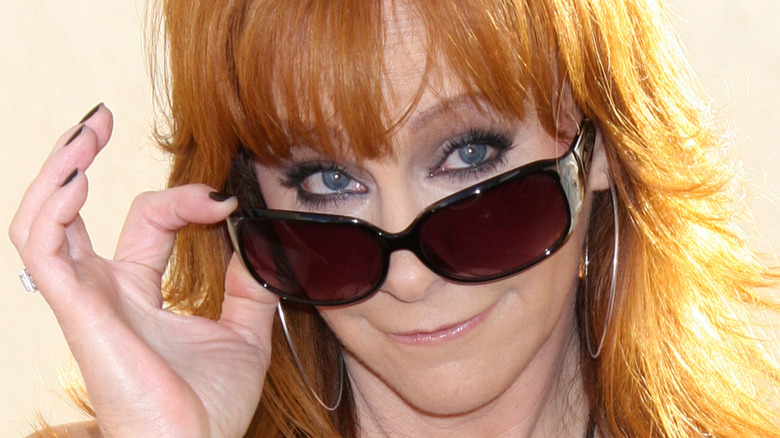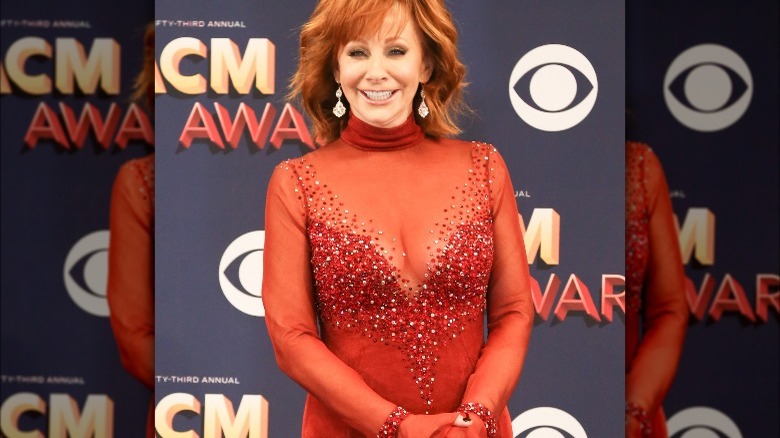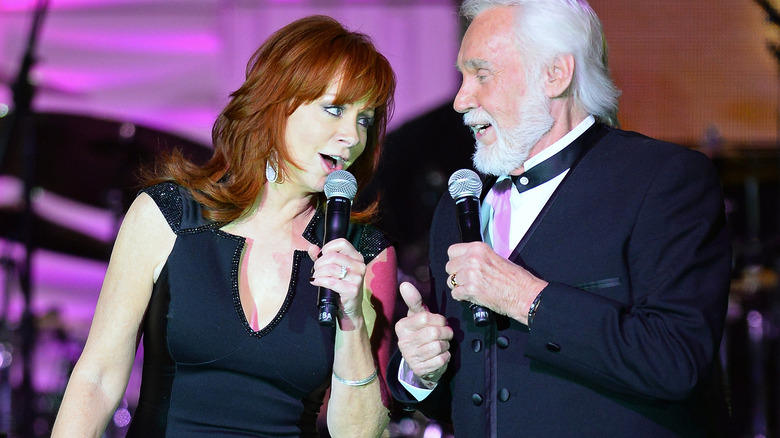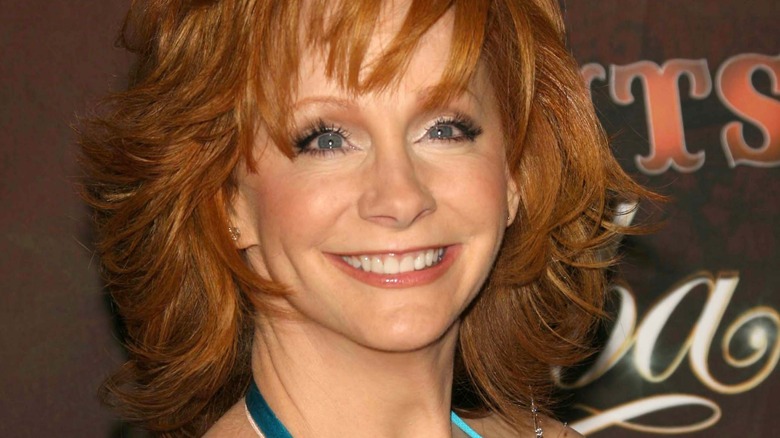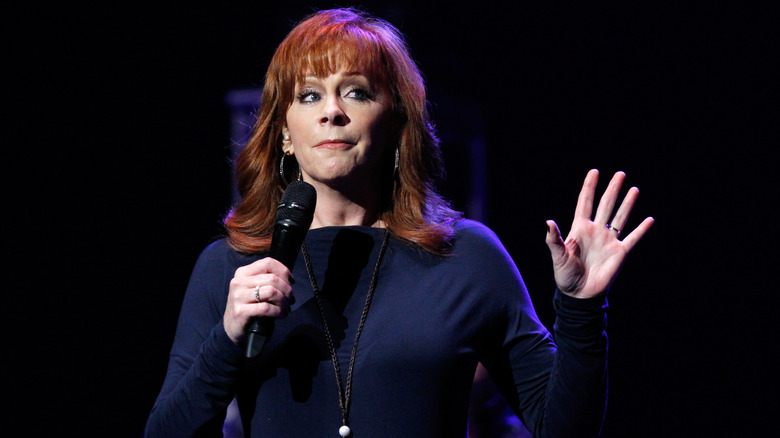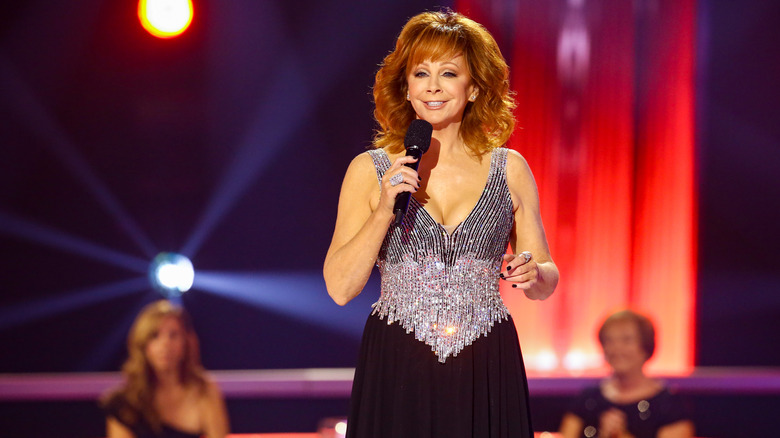What Reba McEntire Fans May Not Know About The Star
Today, Reba McEntire is one of the giants of country music. She's topped charts, given iconic performances, released scores of singles, and branched out into acting with some memorable shows. It seems like she's just sort of always been there, but according to UDiscoverMusic, she had a surprisingly slow start.
Fast forward to 2021, and Esquire was talking to her amid something that was equal parts moving, hilarious, and exactly what the world needed: McEntire had become a TikTok trend, where people posted videos of them doing perfectly ordinary things, set to her "I'm a Survivor." McEntire did her own video, and then, she and her team kicked off a massive project to re-record and remix some of her biggest hits with a 21st-century flair.
But it was more than that: They noted how recent years have turned McEntire from one of many country music stars to a pop culture icon. McEntire herself chalks the whole thing up to a shift in acceptance: "I think the boundaries have been dropped. [Country is] not made fun of. ... I guess it kind of got hip and everybody accepted it more." The world's love for Reba McEntire is about more than just acceptance, though. Here are some lesser-known facts about America's favorite country star.
Reba McEntire paid moving tributes to her parents
Reba McEntire was, says Biography, born in Oklahoma into a rodeo-loving family who specialized in roping steer. Much of her childhood revolved around the rodeo, and a close-knit family who just happened to sing their way through long car rides.
When her father passed away in 2014, the news was picked up by outlets like the Associated Press and Billboard. McEntire tweeted that he had been sick for several years: "It makes total sense to me, he always told us kids never to run your horse to the barn. He was just taking his time to go on home." McEntire later released a video for her song "Just Like Them Horses," as a tribute to her father. The video, says Rolling Stone, was the song that she had sung at his funeral, was filmed on the family's Oklahoma land, and featured McEntire's mother, Jacqueline.
McEntire credited her mother with holding the family together, and in 2020, she announced that her mother, too, had passed away after a diagnosis of cancer. A few months later, she spoke with "Today" about how she had been planning her mother's funeral when COVID quarantine rules began. "It was a true blessing, it really was. I got to stay there at Mama's house and ... going through drawers and boxes, and found pictures we'd never seen before, and we cried, we laughed, we toasted Mama. It was just an absolute, huge blessing to get to do that."
She had a very different career in mind
Reba McEntire wasn't just born into a rodeo family, she went all in herself. In an interview for the documentary film "Dear Rodeo," McEntire was asked if she always had her sights set on climbing to the upper echelons of country music, and that wasn't the case at all. As Wide Open Country notes, her family already had two world champions — her father and her grandfather, who were award-winning steer ropers — and she wanted to be another.
"My dream was to be a world champion barrel racer," she said... but deep down, she knew that wasn't all. She went on to tell a story about how she had gone to the CMA Music Awards, and that night, she looked out the window and rehearsed her own acceptance speech in her head. "I had my speech ready, for one day, I wanted to be that too."
While it's clear which direction she went, McEntire can still hop on a horse and run a barrel-racing course with the rest of them, as clips circulating on the internet show.
The rodeo got her noticed
When she was interviewed by The Oklahoman way back in 1984, Reba McEntire was still just a rising star. At the time, she was getting ready to play a post-rodeo show in an abandoned building, and her regular appearances at barn dances and rodeos overlapped with some chart-topping hits and national attention. They touched on the moment she knew she was a born performer: She was in first grade, and stepped up to the microphone for a solo in a Christmas pageant. Following that, she was able to combine her two great passions — singing and the rodeo — which is ultimately what got her noticed in a big way.
She described how they were connected in the "Dear Rodeo" documentary, saying that it was her father who decided that since she was going to be going up to the National Finals Rodeo anyway — "I loved to party after the rodeo, watch the barrel racing, and have all my buddies up there," — that she could at least get a job there. That was singing the national anthem, which she did from 1974 to 1984 — and then for a few more years after the rodeo's move to Las Vegas.
It was her performance there that got the attention of Texas entertainer Red Steagall, who asked McEntire's mother if they'd be interested in getting her a recording contract. Eleven months later, she had one.
She helped kick-start the conversation about AIDS within the country music community
It's no secret that music can come with a message that can reach a lot of people — and according to Rolling Stone, that's exactly what happened with one particular Reba McEntire song released in 1994. First, some context: At the time, the leading cause of death for people between 25 and 44 was AIDS, and just six years prior, the World Health Organization recognized the health crisis with World AIDS Day. Still, in the overwhelmingly conservative country music community, compassion and awareness weren't conversations that were happening.
Kathy Mattea was the first to publicly appear at the 1992 CMA Awards wearing red ribbons in support of AIDS research, and by 1994, others had started to lend their voices in support, too — most significantly, Reba McEntire. She released "She Thinks His Name Was John," a song written by Sandy Knox and Steve Rosen, in memory of Knox's brother and his death from AIDS-related complications.
The song didn't break the Top 10 in the country charts, but it is credited with doing something even more important: Helping to start a conversation about the impact AIDS was having within the country music community and industry.
She regrets big pieces of her early lifestyle
In 1999, Reba McEntire released "Comfort from a Country Quilt," a book meant to share the down-home, out-on-the-range wisdom and values that she had grown up with. In one chapter, she shares something that everyone can relate to, whether they're fans of country music or not — and that's the fear of getting sick.
She wrote about how grateful she was for the physical and mental strength that she was given, but admitted, "God gave me this body. And I try to take care of it the best I know how. I wasn't always this in tune with my body, and I regret how I abused it while I was growing up."
McEntire goes on to detail what she means, and it starts with her old habits of going out in the sun with no sunscreen. That wasn't the only bad habit she said she needed to focus on, though, and says that yes, she drank too much while she was in college, spent years lifting and carrying heavy feed sacks the wrong way, and didn't drink nearly enough water. Also on the list? Fried food. While she said she had cut back and made those a guilty pleasure, they had once been an every-meal occurrence, from fried bologna sandwiches to fried bacon and gravy made from the bacon grease. Delicious, sure, but healthy? Not quite.
A bout with bronchitis may have saved her life
Life can change in a heartbeat, and Reba McEntire found that out in a devastating way on March 16, 1991. That, says Biography, is when she and her band hopped into two jets to head back halfway across the country to pick up where they'd left off on their tour. One of the planes didn't make it: It collided with a mountain, killing everyone on board. McEntire was devastated, channeling her pain into her album, "For My Broken Heart," and telling Oprah in 2012: "I don't guess it ever quits hurting."
There had been, too, survivors' guilt. McEntire was supposed to have traveled with them, and there would have been a 50/50 chance she would have been on the plane. Instead — suffering from bronchitis — she opted to stay in California for one more day.
She wrote extensively about the crash in her autobiography, "Reba: My Story," telling of how she and her collaborator, Tom Carter, did their own investigation into the crash. She would also write (via CheatSheet) that she was able to take comfort in the advice of a fellow country star who had survived his own tragic, near-death experience. Waylon Jennings was supposed to be on the plane that killed Buddy Holly, Ritchie Valens, and the Big Bopper, but swapped with the Big Bopper at the last minute. She quoted him as telling her: "Don't you feel guilty because of the plane crash. It wasn't meant for you to be on that plane or you would have been."
Reba McEntire hasn't given up on her TV show
In 2001, Reba McEntire made the jump to television with the sitcom "Reba," and it had a good run. According to what she told Taste of Country Nights, they had much, much more planned for the show when they were suddenly canceled: "We had no idea why they canceled us. We were a huge success, so it was a head-scratcher for us."
Getting a definite answer is difficult, but according to TV Series Finale, insiders from MediaWeek and TV Guide said it had nothing to do with ratings. Instead, it happened because of a network merger that put the show on a new channel called The CW, which was looking to attract a demographic outside of what fans of "Reba" were looking for.
McEntire, however, hasn't given up on the show. In 2017, she spoke with ET about her future in television and dropped some tantalizing hints about how a "Reba" reboot might be in the cards: "There have been some [talks] in the past, and hopefully some in the future, too. We'd love to do it." In 2018, she posted a photo on her Instagram showing her with some of her old cast members, writing, "Now all we need is the rest of the REBA cast!!"
She turned down a reality show gig because she couldn't be mean
"The Voice" quickly became a fan favorite once it aired, and over the years, they've welcomed judges like John Legend and Gwen Stefani (who shared on "Late Night with Seth Meyers" that Legend hates it when someone covers his songs). The judging lineup almost looked very different, though, and when she appeared on "Watch What Happens Live with Andy Cohen," Reba McEntire addressed a fan's question about whether or not it was true that she was originally approached for the judge's slot that would ultimately go to Blake Shelton.
Yes, it was true, she said. At the time, "The Voice" was a successful show overseas, and they approached McEntire for the American version. "I watched the tape, and I said, 'No, I'm going to pass on that, because I don't think I'd ever be able to tell somebody that they're terrible, or to go find another job,' ... I couldn't do that day in and day out."
She went on to say that while Shelton shaped up to be the ideal judge, watching the finished program has given her a bit of a different outlook: "Shoot, I shoulda done that!"
What did she really think of that red dress?
Reba McEntire shared the importance of putting on a whole show in her autobiography, "Reba: My Story," and talked about one infamous incident in particular. It was, of course, that sparkly red dress with the plunging neckline that she wore at the 1993 CMA Awards for a duet with Linda Davis. She recalled wanting something special, and picking the color while she was laid up in bed following surgery on her foot. And then? "From the minute I walked onstage to sing, I was hearing 'o-o-o-o-o-s' and 'a-a-h-h-hs.' But I soon realized that some of those sounds from the audience were actually gasps — at the lowness of my neckline."
The following day, she found herself plastered all over front pages, and letters of pure rage were showing up in Tennessee newspapers. Radio show callers were shouting from the rooftops, and McEntire later commented at a Caesar's Palace show, "I wish she [designer Sandi Spika] had told me that I had it on backwards!"
Jokes aside, McEntire loved the dress: she told People that after a lifetime of jeans, flannels, and hand-me-downs, the chance to get up on stage and sparkle like there was no tomorrow was the best feeling. Then, years later, she made an undeniable statement: She wore it again, this time, to the 2018 ACM Awards (via People).
Reba McEntire had a major falling out with Kenny Rogers
Any conversation about the giants of country music has to involve Kenny Rogers, but for Reba McEntire, it turns out that conversations about him were once awkward.
She shared the story of why during an episode of "I Miss... 90s Country Radio With Nick Hoffman" (via Taste of Country), and said that she had actually planned on doing a duet with Rogers. That was supposed to be "Heart Won't Lie," which fans will know she released with Vince Gill. What happened? "... the keys just would not work," McEntire explained. "Then I took the song, and did the duet with Vince. I didn't tell Kenny, which was my mistake, totally."
To add insult to injury, the single ended up charting at number one. Rogers absolutely called her out on it, and during a conversation at the CMA Awards, McEntire admitted that it had never crossed her mind to get in touch with him and apologize ... although she did so wholeheartedly. Fences mended, Rogers invited her to join him in a TV movie, and it was an offer that came just after the plane crash that claimed the lives of McEntire's band. She would later credit Rogers for helping her get through the difficult time, and was one of the many artists who paid a heartfelt and tearful tribute to him after his passing in 2020.
There was never a question about her accent
There's no telling what's going to make a performer stand out, and according to Cowboys & Indians, one thing that has made Reba McEntire such an enduring, endearing personality is that she's stayed true to her roots. That becomes clear just by listening to her, because she still has the same Oklahoma accent she's always had — and she's spoken about just how much it means to her, and how there was no question about keeping it.
She explained to Southern Living that she had always been proud to be from Oklahoma, and "When I went to LA and people had said, 'Oh, you kept your accent.' I said, 'Well, that's the way I talk.' 'Yeah, but don't you want to change it?' And I said, 'Well, why? Then that wouldn't be Reba. That'd be somebody else.'"
McEntire has said that she's encouraged others in her family to keep their accents and stay true to themselves, too. When her niece, Garrett Smith, tried to break into acting, one of the first things she was told when she got to California was to lose the accent and go blonde. McEntire warned her against it, saying, "You can't be cookie-cutter. You've got to stand out and be different. A good kind of different."
Here's how she learned not to improv
Reba McEntire appeared on "The Late Show with Stephen Colbert" in 2019, ahead of her 17th year hosting the ACM Awards. When he asked if there was anything that had ever gone wrong during the live show, she confirmed that she'd been right in the middle of it.
Keith Urban had been scheduled to go on stage next, but when he couldn't find his guitar, Dick Clark sent McEntire out on stage with directions to stall. No plan, just improv. She headed out to ask everyone if they were having a good time, and was met with silence — before Clark came to the rescue, and filled everyone in on the delay. McEntire said that she had briefly thought about telling a joke, but quickly decided against it with the memory of a 1978 incident where she'd gotten heckled and run off stage after one went south.
Colbert did, of course, ask her to tell the joke, and it was terrible: "Do you know the difference between unlawful and illegal? Unlawful means it's against the law, and illegal is a sick bird." After that, her mother told her, "Sing... don't talk."
Reba McEntire thought she didn't have a place in the world of today's country
It's easy to think that once someone becomes an icon in the entertainment industry, it's all smooth sailing from there on out. In 2015, Reba McEntire spoke with Rolling Stone to say that for her, that wasn't the case at all.
Sure, she had sold more than 56 million albums, had a hit TV show, and was a concert favorite, but said that after 2010, she deliberately took a step back from music. Why? She no longer heard her type of trademark song — those that told a story — on the radio. It wasn't until she got an offer from Nash Icon Records that she returned to sing again, but she said that it wasn't easy.
"I'm a regular person — of course I've got doubts and insecurities," she said when asked if she thought people missed hearing her new releases. "I had no idea. I certainly wasn't like, 'Well, I bet they can't wait until my stuff comes out. Good Lord, I bet they've been losing sleep.'" At the time McEntire was signed to the new label — which was founded to have a focus on veteran artists — she was the very first to be approached and say yes. Simply put? "Well, I was flattered to death."
